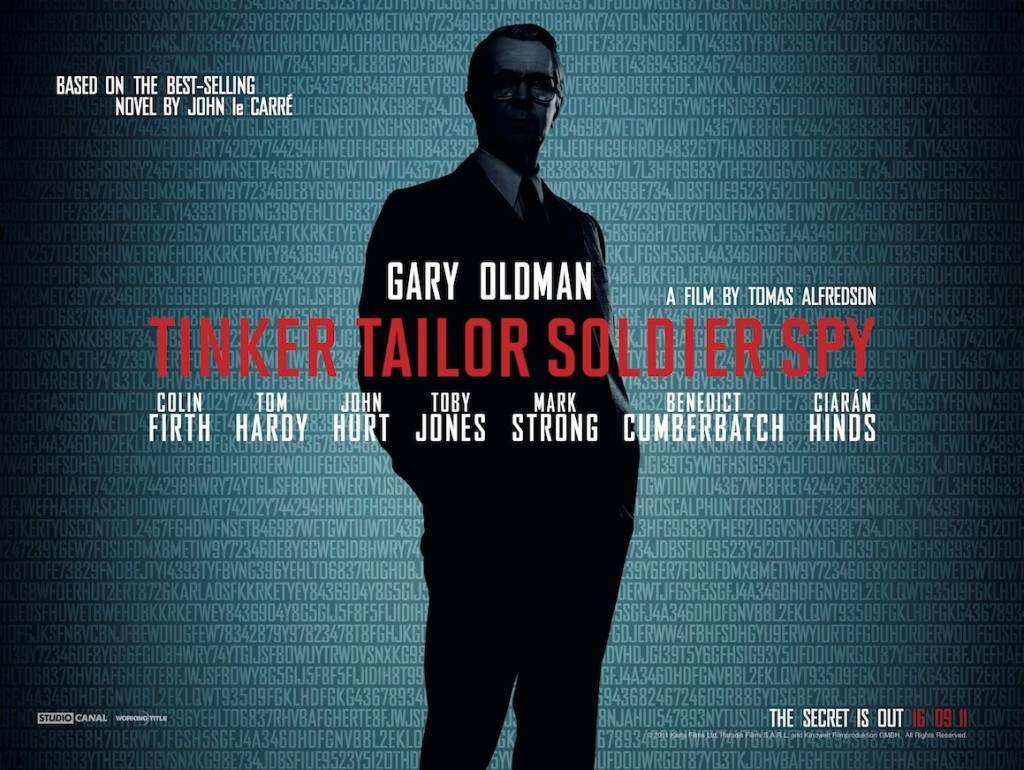Tinker Tailor Soldier Spy (2011) – Nearly two years ago, I talked about Tinker Tailor Soldier Spy, specifically the BBC version starring Alec Guiness and a host of British actors to rival the ages. In it, we see spycraft more as it really was than in the films and media of both le Carré’s time and our own modern milieu. For the most part, people in suits smoking pipes and drinking hard liquor while circling around each other in a constant game of cat and mouse seems more the order of the day than high-flying stunts and witty catch-lines. Either you become the job or this line of work simply won’t fit you, and I think that’s what George Smiley, your protagonist, should demonstrate – all other obligations come secondary, but you lose your humanity in the process of developing duplicitous dealings.
We learn the story of the Circus (in other less spy-like terms, MI5, which became the basis for James Bond’s fake MI6). Britain’s secret service has gotten a Russian mole burrowing deep into its secrets, and there are four primary suspects. Unfortunately, all of them are capable, as per a spy organization, and deceiving them into revealing their secret won’t be easy. He could very well be the head of the whole Circus, or merely a lackey; there could be two or three total, an organization corrupted from its primary leadership positions. In any case, any internal investigation seems completely out of the question; the mole knows we search for him. Thus, George Smiley (Gary Oldman), a “retired” spy after the fallout of the previous administrator (merely called Control), must emerge out of retirement to enter back into that world to root out the mole, the only world which seems like home.
I am particularly impressed with Gary Oldman (is he NOT the man?), as he pretty much plays Smiley exactly as you would imagine: logical, rational, cold, and emotionally attached. It’s clear that he is much better at this than his domestic life, and Oldman brings a reserved stillness to the role that few other actors could ever match. While everyone else seems scrambling in a hurry and blabbers on about whatever, Smiley sits, watches, and observes. He knows how to read people, if not be a very genuine person himself. The few moments of humanity we do see out of him come suddenly, and just as quickly retreat into a steely facade required for spying.
The film also attempts to match the same star-studded cast as its BBC fore-bearer, to the exact same success. Seriously, just off the top of my head I identified John Hurt, Colin Firth, Benedict Cumberbatch, Tom Hardy (yes, Bane and Commissioner Gordon in a different movie together feels really weird), and a bunch of other stellar actors I can’t identify by name but certainly know from their work. Everybody gets to chew the scenery at one point or another, and with material like this it presents a perfect opportunity for all of them to…do whatever they want, really. It’s a series of little amazing performances that work perfectly.
To contribute to all of that, the film exudes a cold atmosphere that, while not exactly exciting, seems best categorized as “indifferent”. The color palette tries to recreate the look and feel of the 1970s with a clear advance towards muted tones, and this also lends to the entire film a strange air. Some call it “tense”, and while I suppose we could characterize it in that way, I’m not sure I would call anything in this movie “tense”. Fast-paced, in a sense, but it’s hard to care for anyone in this film with its strange sense of dread.
However, and here’s where things go downhill, I lack the objectivity to tell you whether or not this is either a faithful adaptation of the book/series, or that I already know the necessary information to piece together what happened already. I already know what will happen, along with the ending, so when events occur I am not sure whether an audience fresh to this experience could, possibly, piece it together. Part of the new Tinker Tailor Soldier Spy’s problems rests in its very short run-time for a plot of this density (two hours and seven minutes isn’t even close to modern Marvel movies, if you can believe that). Details aren’t exactly sparse, but the screenwriters attempt to cram a lot of information into a small time frame, which sounds like a disastrous foolhardy effort from the start.
Now, I don’t blame anyone for trying to adapt Tinker Tailor Soldier Spy into a film; clearly, the bones for such an effort exist quite clearly. However, there’s just too much meat, and figuring out what to leave in, what’s ancillary, and what to cut isn’t exactly clear in any piece of media where George Smiley holds sway. I honestly could not tell you whether the average person could simply watch this film, completely understand its plot, and convey it to me. I don’t go with the idea that this is a “atmosphere” movie, simply as the original media doesn’t take that tack, and if you view it that way you might enjoy it. The lack of any emotional content for the most part also becomes problematic for a general audience; there’s really no one to latch onto, and you’ve got to wonder whether or not most audiences would accept such a thing in our age of total, utter transparency.
So, would I recommend it? Maybe? Most other people who’ve seen this tend to say the film itself is confusing, so I’d probably recommend the book or the BBC series over this particular iteration. Much as I like the film itself, it does lack some of the complexity and nuances that made the climax of the original so interesting; without that information, things simply HAPPEN without enough context to see them as interesting. Oh well!

